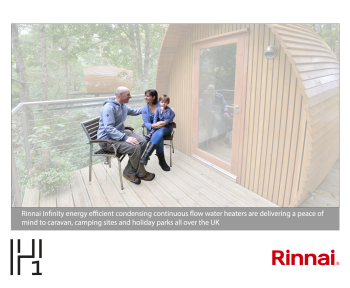Chris Goggin of Rinnai looks forward to the establishment of renewable liquid fuels to broad markets.
The UK will be required to find alternative energies, some of which will be completely unknown to the British public. One such fuel is Renewable & Recycled Carbon Dimethyl Ether (DME).
A collection of renewable feedstocks, including waste, can be used to manufacture DME, a sustainable fuel that can be produced quickly. Chemically speaking, DME and LPG are identical. It create a "drop in" solution to lower carbon, current supply LPG networks can carry a percentage blend of Renewable & Recycled Carbon Dimethyl Ether (DME) without requiring equipment modifications, which is a huge benefit for current appliances and systems. DME can also be utilised independently as a fuel that is 100% pure, especially for commercial or industrial customers.
DME has several fuel qualities that make it easy to use in diesel-powered installations and appliances. It combusts cleanly and has no "soot" emissions. It has a very high cetane value, which reveals how ignitable the fuel is for engines using compression ignition.
When compared to standard fuels, DME is safer and can cut greenhouse gas emissions by up to 85%, enhancing local air quality. By using DME, measurements for PM, SOx, and NOx are all notably decreased. The potential of DME introduction on a national scale soon is further increased by the projected fast increase in production capacity in Europe.
A dual venture between SHV Energy and UGI International, two of the world's top distributors of LPG (liquefied petroleum gas), is the Netherlands-based company of renewable and recycled carbon DME, Dimeta. Leading the way in the commercial manufacture and use of Renewable and Recycled Carbon DME to decarbonise the LPG industry in the UK, Europe, and the US, Dimeta is forward-moving a more sustainable future and expanding admission to reasonably priced low-carbon energy.
Dimeta and Rinnai want to foster the use of recycled and renewable carbon DME in a multitude of off-grid heating situations while increasing consumer awareness of these products. Dimeta is helping to define UK manufacturing values, which is a measure towards standardising DME boilers and DME water heaters. Regulators are expected to approve centralised industry guidelines later this year.
A Memorandum of Understanding (MOU) has been signed by Rinnai and Dimeta. The two firms will cooperate to examine the possibility of combining DME and LPG for use in current equipment in the field of off-grid heating. Additionally, Dimeta and Rinnai want to produce products that are exclusively designed for DME, such as hybrid RDME heating systems, RDME boilers, and RDME water heaters.
Read more about our exciting https://www.rinnai-uk.co.uk/rinnai-knowledge-hub/rinnai-news/dimeta-and-rinnai-team-greener-gas-appliances
To expand their capability and highlight the value of support throughout the whole value chain, Dimeta and Rinnai's partnership will first concentrate on the European market.
Designing and manufacturing RDME low carbon heating systems for commercial properties that are disconnected from the UK national grid is a responsibility made by Rinnai. For UK clients looking to decarbonise their off-grid heating, Rinnai provides efficient, cost-effective, and technically feasible options.
Rinnai and Dimeta are aware that substitute fuels need to guarantee decarbonisation in addition to operating at the same level as conventional off-grid fuels. Rinnai is striving to offer a range of carbon-neutral products and energies to off-grid customers in the United Kingdom.
Gas-fired water heaters for homes and businesses, solar thermal systems, electric cylinders and low-GWP heat pumps that provide instantaneous property decarbonisation are all part of Rinnai's H3 product line.
Subscribe to the Rinnai Pathways newsletter to receive updates and assistance on the evolving energy and policy landscape in our sector. www.rinnai-uk.co.uk/contact-us/newsletter-sign (use a button not a weblink)
To find out more about renewable about renewable liquid fuels and the potential benefits this will have for the future of off-grid heating visit:
